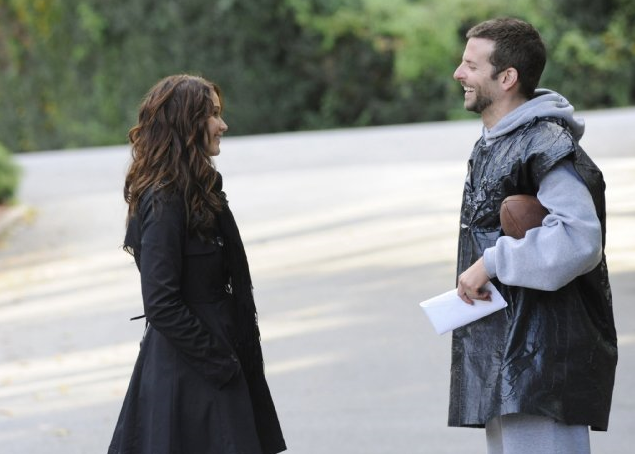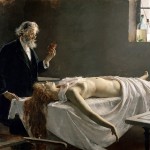I’m sure many of you have seen the movie, Silver Linings Playbook and (hopefully) found it intriguing. Perhaps you think the it is about mental illness, family, redemption, etc. Personally, I have concluded that Silver Linings Playbook (SLP) is a story about human sexuality, and more specifically, how we come to understand our sexuality through experience. Amazingly, this idea of experience at the heart of SLP is also at the heart of John Paul II’s Theology of the Body (TOB). As I watched SLP with TOB in mind, I found more and more examples of John Paul II’s teachings. Here, I have summarized some of my observations.
Primarily, this story is about two sexually broken people. For Pat, this comes in the form of infidelity, a broken marriage and perversion. In Tiffany’s case, lack of sexual desire and her husband’s death while trying to spark something meaningful contributes to a frustration which manifests itself sexually. In both cases, what the characters think is love is radically transformed by the end of the film–a TOB style redemption story perhaps.
From the beginning of the movie, Pat has a distorted understanding of the true nature of love. He understands it as a conditional relationship rather than one of unconditional devotion to the good of another. When confronted about his obsession with reuniting with his wife he says, “It’s electric between us! Okay, yeah, we wanna change each other, but that’s normal. Couples wanna do that.” Articulated another way, “I cannot love you for who you are, unless you do what I want you to.”
So let’s look at Tiffany. Early in the movie, Pat walks Tiffany home. Tiffany asks him to have sex, and he refuses. Good for him. But why is Tiffany asking this of a complete stranger? Tiffany’s request is a direct result of her lack of sexual desire in her marriage to Tommy. In response to his death, she turned to giving herself sexually to others in her pain and longing for intimacy. Tiffany so longs for the conjugal intimacy of her marriage that she is trying to find Tommy in other men. So both characters have a distorted view of human sexuality. One could argue that these are views given to them by culture.
Let’s move to the diner scene, one of my favorites in the film.
While in the diner, Tiffany opens up to Pat about the sexual deviances she pursued after Tommy died. Pat listens with a perverted grin and laughs about how crazy she is, claiming he is “nothing like” her. Pat thinks that he is better than Tiffany because he is not a “slut.” Yet, Pat is the one enthralled by Tiffany’s perverse sexual experiences while Tiffany obviously regrets these experiences. Pat thinks chastity is simply not having sex outside of marriage, but this far too narrow a view. Tiffany, actually, has a better understanding, because in a genuine effort to be honest and open to Pat, she is the one who is practicing chastity. As JP II argues: “to be chaste means to have a transparent attitude to a person of the other sex” (L&R 170). Tiffany demonstrates this in her honesty, as well as in her understanding that actions are not all that make one chaste, but also one’s mind must be conformed to chastity.
A few scenes later, Pat drives one of Tiffany’s flings off of her porch. In disgust, Pat tells the guy that girls like Tiffany need to be protected, cared for, and respected. This episode is a turning point. First, Pat is acknowledging Tiffany’s personhood and her need for respect. Second, Pat shows a deeper understanding of Tiffany’s needs, as well as taking on the role of a protecting figure. It also displays an embracing of his masculinity in light of Tiffany’s femininity, pointing to the fact that “it is only through the duality of the ‘masculine’ and the ‘feminine’ that the ‘human’ finds full realization” (Letter to Women, 7). Third, Pat shows that his views on human sexuality and its utility have changed. Pat’s soliloquy perfectly articulates an understanding of JPII’s personalistic norm which affirms that “the person is the kind of good which does not admit of use and as such the means to an end” (L&R 41). In affirming this norm, Pat has a foundational understanding of authentic love which opens him to Tiffany’s big request.
So, when Pat asks Tiffany to do a favor for him, she says, “I always do this. I give and give and then I’m empty.” Tiffany’s claim is a perfect expression of JP II’s first principle: that man can only find himself through a complete gift of self. In her promiscuous behavior, Tiffany kept giving away herself instead of giving of herself. She wrongly believed that she could keep giving and giving all of herself in the hopes that someone would reciprocateor that she would find meaning/happiness. Through this experience, however, she comes to understand that “a person’s rightful due is to be treated as an object of love, not as an object for use… love is a requirement of justice” (L&R 42). Tiffany senses the injustice of her situation and demands more than the injustice of usury. She wants commitment from Pat, because she knows that is the only way they can foster a healthy relationship.
As the movie continues, Pat and Tiffany find themselves in a growing friendship. Eventually, Pat professes his love for Tiffany. The next scene is at Tiffany’s house where the camera pans onto Tiffany’s lone pair of shoes. This scene, which you may well have missed if you blinked, is Pat and Tiffany’s experience fully realized. Like other films, one would expect Tiffany’s shoes to be accompanied by Pat’s, signifying that they slept together. But no; they realize that their sexual brokenness cannot be fixed by sexual promiscuity, but can only be properly understood and healed by giving themselves first in friendship as their commitment to each other grows. In pursuing a chaste relationship based on self-gift, both Pat and Tiffany learn how to love authentically. They understand that to give themselves to each other outside the marital bond would be dishonest to their relationship, as the commitment and permanence of that bond is not present. In this way, they conform themselves to JP II’s ideal of sentimental love, which “keeps two people close together, binds them-even if they are physically far apart” (L&R 110). This means that authentic love can share intimacy without physical connection, especially that of a conjugal nature.
The few observations I have discussed here are only the tip of the iceberg, but I hope they have sparked some thought. Next time you watch the movie, pay attention to how Pat and Tiffany’s experiences shape their understanding of each other’s sexuality and personhood. They start from a frame of reference which left them broken and searching, and they are able to find the truth without the explicit help of Theology of the Body. This speaks to the power of experience, and its ability to work from within culture and transform it. Furthermore, it shows howinherent the experience of the body is to bringing the person to truth. This is important because TOB is so fundamental to the human experience that, even without studying it directly, we can come to know its truth. This is the testimony of Silver Linings Playbook, and I challenge you to discover it for yourself.
***
Thomas King is a senior at Hillsdale College majoring in History. He is the Operations Director of a local nonprofit, and he and his wife run a college outreach and hospitality house in Hillsdale, Michigan.














